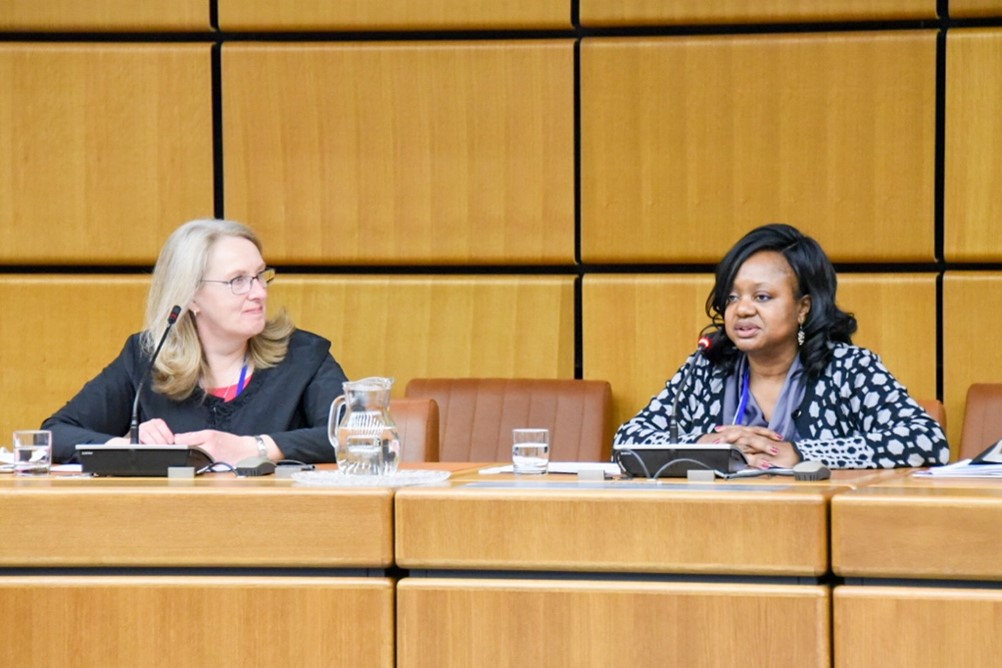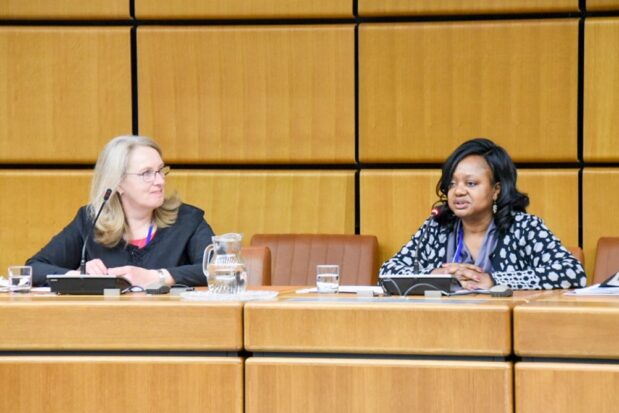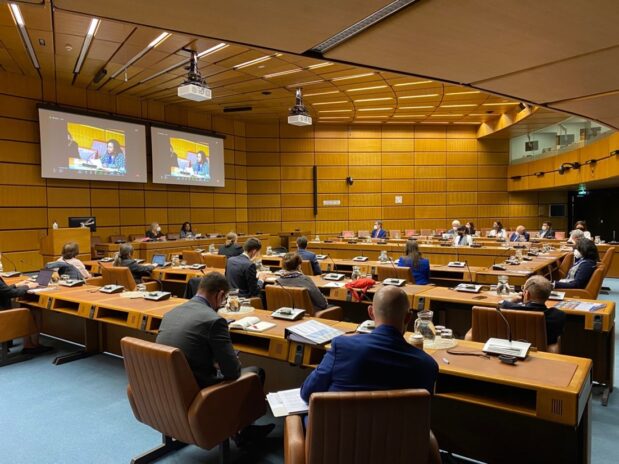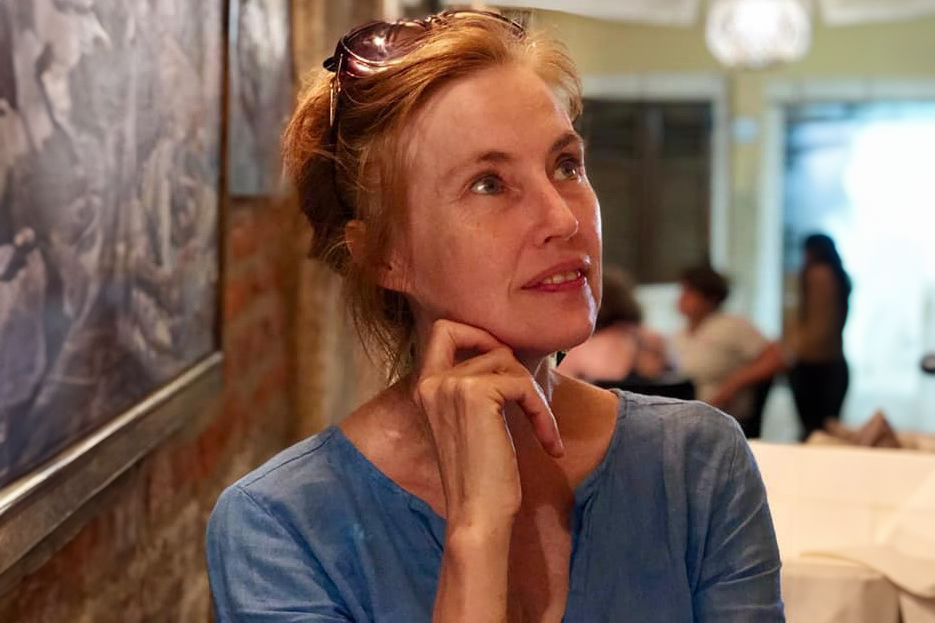
The Vienna Center for Disarmament and Non-Proliferation (VCDNP) and the U.S. Mission to International Organizations in Vienna hosted a hybrid side event at the Conference of the Parties to the Amendment to the Convention on the Physical Protection of Nuclear Material (A/CPPNM). The event, entitled “The A/CPPNM and Nuclear Security: A Conversation with U.S. Under Secretary of State Bonnie D. Jenkins,” was held on Tuesday, 29 March 2022 in-person at the Vienna International Centre as well as via Zoom.

During opening remarks, U.S. Under Secretary of State for Arms Control and International Security Bonnie D. Jenkins discussed the scope of the A/CPPNM, including assessing current challenges in the face of a changing threat landscape, highlighting the importance of the Amendment for global nuclear security, and providing an overview of the U.S. priorities for the inaugural Review Conference. Four priorities of the Conference for the U.S. were outlined, including: (1) dedication to universalize and fully implement the Amendment; (2) promote global exchanges on good practices, lessons learned, and emerging threats and challenges; (3) enhance outreach and engagement with countries not yet party to the Amendment to facilitate universalization; and (4) support a regular and robust review process. The role and importance of international organizations such as the International Atomic Energy Agency (IAEA) was highlighted, in addition to engaging civil society and raising diverse perspectives in the field of nuclear security.
One of the stated goals of the Review Conference is to assess the adequacy of the Convention and its Amendment. While the convention and its Amendment are considered adequate by the Ambassador, she emphasized that the Convention should be adaptable to evolving scenarios. Ideally, regular review conferences should address new challenges and incorporate lessons learned into the Convention so that the Convention works even in difficult times.
Adherence to the Amendment of the CPPNM harmonizes procedures among States Parties, thus providing for a strengthened international physical protection regime, but the Amendment is still far from achieving universalization. To facilitate effective implementation and engagement towards expedited universality globally, Ambassador Jenkins encouraged recognition that each country has a stake in safety and security of nuclear material. The international community is part of the larger nuclear security architecture, and a grave act of nuclear terrorism anywhere would have global consequences for all.
In expanding access to nuclear science and technologies for peaceful uses, the need to maintain a strong global nuclear security regime was reiterated as paramount. Ambassador Jenkins stressed that the highest standards of safety and security should always be adhered to by national and international stakeholders, including industry. In maintaining the highest standards, the process often becomes time consuming and complex, which could present a barrier to countries which hope to access peaceful uses in order to achieve the United Nations Sustainable Development Goals (SDGs). Recognizing this challenge, the U.S. also seeks to facilitate a more flexible process of exchanges and discussions to better meet the demands of countries seeking assistance.
The Tenth Review Conference (RevCon) on the Treaty on the Non-Proliferation of Nuclear Weapons (NPT) is scheduled for August 2022. Access to peaceful uses under the “third pillar” of the NPT has gained special attention in the preparations for this RevCon. Ambassador Jenkins stressed that peaceful uses of nuclear technologies benefit everyone and recognized the contribution of peaceful uses to the achievement of the UN SDGs. In this regard, the U.S. demands the highest standards, to build confidence that peaceful uses can be used safely and securely.

Key challenges to universalization include ‘low awareness on the international tools and assistance available for implementation,' as identified in a report released last month by the VCDNP, titled ‘Accession to and Impact of the Amendment to the Convention on the Physical Protection of Nuclear Material on States Parties’. Ambassador Jenkins reiterated that good practices from the IAEA, including ongoing work on peaceful uses, can serve as a continuous reference for advancing the nuclear security architecture as a whole. Moreover, non-governmental organizations, regional organizations and other international organizations are critical in furthering this agenda through capacity building, providing expertise, outreach to States that are not yet party to the Amendment and enhancing physical protection infrastructure.
The conversation with Ambassador Jenkins then moved to the topic of diversity in nuclear policy. Prior to her current position, Ambassador Jenkins championed the establishment of the Women of Color Advancing Peace and Security (WCAPS) to address the diversity gap in the field. In particular, Ambassador Jenkins stressed that the number of women in the field could be increased, especially among the higher-levels and leadership roles. Moreover, she highlighted that there is a long way to go in the field in terms of engaging people of color. Stressing the importance of granting everyone a seat at the table to provide different views and perspectives in order to address the global challenges the international community faces, she highlighted the need to work with a diversity of countries. The more regular dialogue on diversity occurs and greater inclusion at the table will assist in overall retention of different voices in the field. As Ambassador Jenkins stated, “We do not know what we miss out on when we do not invite all parties to the table,” – stressing that everyone belongs.
The Amendment to the CPPNM created new momentum for strengthening the domestic physical protection regime and brought greater clarity in responsibilities across the nuclear security field. The need to keep up with emerging technologies was highlighted, especially regarding verification. The nuclear security community will need to remain open, ready to learn and willing to engage on these challenges. The Ambassador highlighted the need to assess changes in the threat landscape and ensure the Convention can evolve and respond over time as needed. To meet these challenges, continued engagement with NGOs and International Organizations to enable a strengthened global nuclear security framework overall will be required.
VCDNP Executive Director Elena K. Sokova moderated the event. Earlier this month, VCDNP also hosted a virtual panel discussion in support of the A/CPPNM RevCon entitled “Towards a Successful A/CPPNM Review Conference.”
